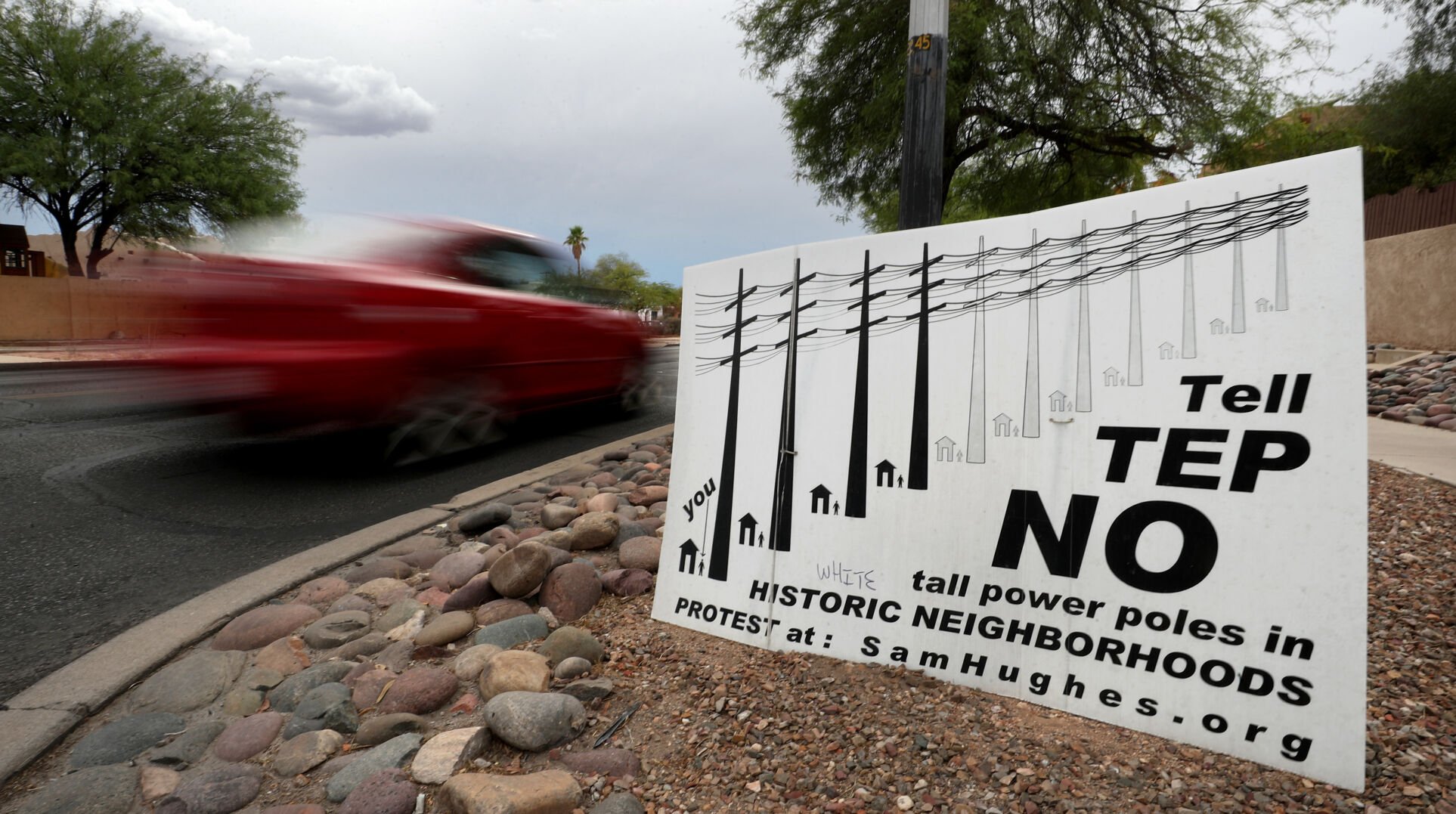Tucson voters have rejected a new Tucson Electric Power Co. franchise agreement with the city that included a fee to help fund the underground installation of a major transmission line through midtown as well as funding future climate-action programs, early results show.
Proposition 412 would have raised the TEP bills of city residents an average of about $1 a month through a new fee “community resilience fee” while keeping the current franchise fee.
Prop. 412 was losing 55 percent to 45 percent, with 129 of 144 precincts reporting, preliminary results from the city clerk’s office Tuesday night showed.
It said 62,796 total votes were cast.
Within an hour of the initial election results, TEP said in a prepared statement it was disappointed voters defeated Prop. 412, “as it offered a collaborative response to important energy-related issues.”
In the near term, TEP will resume development of a new 138-kilovolt transmission line to serve growing energy needs in central Tucson, in consultation with area residents and stakeholders to identify the best route for the line, TEP spokesman Joe Barrios said Tuesday night.
The company says it will restart its review of potential routes for the project through central Tucson. “Because the line is urgently needed to maintain reliable service, we will seek to complete it by the summer of 2027 – the same timeline we hoped to achieve if Prop 412 had passed,” the company said, adding that more details will be provided soon to area residents.
Final results are expected by Monday, and the Mayor and Council are scheduled to canvass the election results at their meeting on May 23, according to City Clerk Suzanne Mesich.
The new 25-year franchise agreement was backed by TEP, city leaders and neighborhood activists as a way to fund underground installation of a proposed high-voltage transmission line running from South Kino Parkway and East 36th St. to West Grant Road and Interstate 10.
Residents of historic neighborhoods said the overhead lines and poles up to 110 feet tall would ruin views and destroy property values, while city officials said TEP’s plan would violate ordinances that ban overhead power lines in Tucson’s designated scenic and gateway corridors.
TEP has said undergrounding the project would be too expensive — some 13 times the cost of overhead lines or about $60 million to bury six miles of the line — and it opposed seeking funding through an increase in its state-regulated rates.
With the expiration of TEP’s city franchise agreement approaching in 2026, city leaders negotiated a new agreement with TEP that includes a new fee mainly to fund the cost of undergrounding the transmission line over the first 10 years and allowing for some proceeds to be used for the city’s climate-mitigation initiatives.
TEP said the new line is urgently needed to boost capacity to keep up with load growth along the route, which runs astride the University of Arizona campus into the midtown area.
The new franchise agreement was backed by TEP, Mayor Regina Romero and most of the city council, along with the Tucson Metro Chamber, the Southern Arizona Leadership Council and Sun Corridor Inc.
Other supporters included the Sam Hughes Neighborhood Association; and the steering committee of the Underground Coalition, which includes about a dozen neighborhood associations, according to Yes on 412, a city-registered political action committee backed by TEP shareholder funding.
But Prop. 412 faced criticism from different opponents for varying reasons.
Council member Steve Kozachik said he favored putting the measure on the ballot but TEP should commit some of its own money to help Tucson further its climate goals, instead of simply relying on fees from ratepayers.
The Pima County Republican Party said it opposed any funding of the city’s climate-change action measures, while some environmental activists contended the proposed new franchise agreement didn’t go far enough to prompt TEP to move faster to carbon-free renewable energy.
The only apparent organized opposition to the franchise agreement was a group called Prop 412 facts, created by the Phoenix-based Strong Communities Foundation of Arizona, a nonprofit voter education organization espousing conservative, free-market values.
Other opponents said TEP shareholders should pick up at least part of the extra costs of undergrounding the new transmission line.
TEP initially filed for approval of the transmission line route with the state Power Plant and Transmission Line Siting Committee in August 2021. The committee holds hearing and makes recommendations to the Arizona Corporation Commission whether to approve a plant site or line route.
But after drawing fire from city council members who said TEP was trying to ignore city ordinances, the company withdrew its application in February 2022 to allow more time for negotiations with the city.
Get your morning recap of today's local news and read the full stories here: http://tucne.ws/morning




